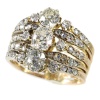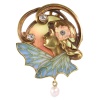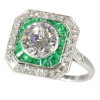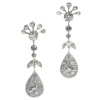Nous offrons des facilités de paiement pour le bijou de vos rêves. Demandez nous les détails. Expédition assuré gratuite !

Antique jewelry glossary
Welcome to our extensive antique jewelry glossary with around 1,500 jewelry related entries.If you feel you are missing an explanation, feel free to let us know and we will add it.
A - B - C - D - E - F - G - H - I - J - K - L - M - N - O - P - Q - R - S - T - U - V - W - X - Y - Z all
Synthetic sapphire
A synthetic gemstone resembling a natural sapphire, first produced by the Verneuil Furnace in 1910. Early experiments had used cobalt oxide, but the colour concentrated in patches, so magnesium oxide was added as a flux; this resulted in a stone that was a synthetic spinel rather than a synthetic sapphire. Later magnetic oxide of iron and titanic acid were added, and a clear transparent blue synthetic sapphire was produced. The synthetic star sapphire was produced by adding more titanium oxide, which precipitated to form needles of rutile. A colourless variety (misleadingly called walderite) has been produced by use of pure alumina, and various coloured varieties by use of different metallic oxides, e.g. with nickel oxide a pinkish-orange stone and with vanadium oxide a greenish stone resembling alexandrite. The synthetic varieties can be distinguished by their showing, when viewed through a microscope, curved colour bands as opposed to straight bands, and sometimes minute gas bubbles.
From: An Illustrated Dictionary of Jewelry, autor: Harold Newman, publishers: Thames and Hudson









